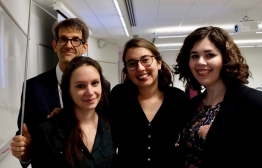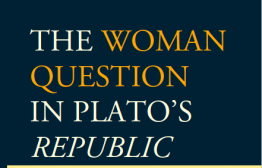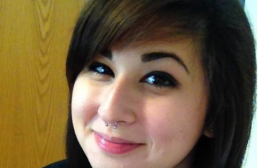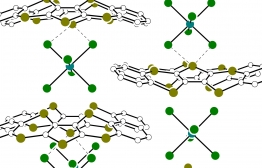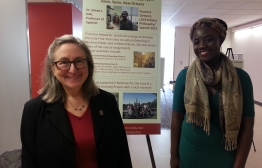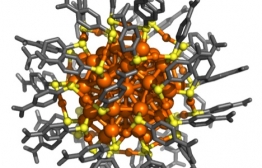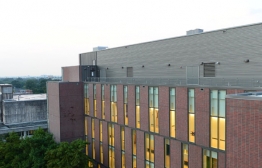As a Loyola student, you have the opportunity to work alongside our talented professors to partner in collaborative research. Learn more about some recent research and projects currently underway.
Students and Faculty Work Together on Effective Altruism
Loyola undergraduates Melody Bigelow-Monssen, Emily Ortiz, and Kalya Koonz worked with philosophy professor Leonard Kahn on two effective altruism projects in the spring of 2019. The results was a panel discussion during the university's Earth Week celebration and a scholarly review of William MacAskill's Doing Good Better, co-written by Ortiz and Kahn, which was published in the journal Philosophy in Review.
The Woman Question in Plato's Republic
Dr. Mary Townsend's book The Woman Question in Plato's Republic was published by Lexington Books (Lanham, MD), August 2017.
Student and faculty member collaborate on scholarly review
Philosophy senior Tara Malay and faculty member Dr. Leonard Kahn co-authored a review of Carol C. Gould's Interactive Democracy: The Social Roots of Global Justice for the journal Philosophy in Review. This project was sponsored by the Loyola University Collaborative Scholarship program. You can read the review here.
Malay begins graduate work in linguistics at the University of Jyväskylä in Finland this fall (2016).
Synthetic Organic Chemistry
Dr. Stephenson focuses on the synthesis of sensors based on supermolecular interactions, utilizing synthetic organic chemistry to form useful new materials; in other words, his main interest is in studying the interaction of molecules in order to make biocompatible sensing materials. Specifically, Dr. Stephenson's projects work to synthesize and study new sensors based on xanthene dyes such as rhodamine B. The sensors are formed by modifying existing dyes to have specific functions.
Organic Superconductor Synthesis
Students working under Dr. Qin will have the opportunity to synthesize novel charge transfer complexes based on sulfur-rich, aromatic, heterocyclic molecules; students will then test these compounds as new organic conductors and superconductors that could help form the basis for superconducting power grids.
Nearly one-tenth of all electrical power is lost as it travels from the electric generators to the final consumers. A superconducting power grid would eliminate this wastage and have tremendous economic and environmental benefits. The best intermetallic superconductors have achieved Tc’s (the temperature at which superconductivity occurs) as high as 100 K, which allows them to operate at liquid nitrogen temperatures, but they are brittle, dense solids—a serious shortcoming for power cables. In contrast, organic materials tend to be lighter in weight and more pliable than inorganics, making them promising components of superconducting power grids.
Although inorganic chemists and physicists have dominated the field of superconductor discovery, superconductivity was first observed in organic molecules in the late 1980s. Despite this fact, this field is under explored, and there are very few classes of organic superconductors. Dr. Qin hopes to further the field and help solve the problem of energy waste.
First-Year Seminar on Cultural Blending
Islam, Spain, New Orleans
(This course is ONLY open to students who are enrolled into the Honors program)
Professor Eileen J. Doll, Department of Languages and Cultures
Disciplines: Literature, Medieval History
How does one culture influence another? Starting with the medieval history of Spain, when Islamic culture was at its peak in Europe, this course examines how Islamic culture affected the existing Christian and Jewish cultures of the Iberian Peninsula. We explore the cross-cultural history of 18th-century New Orleans, when it was part of the Spanish empire. Connecting to the present, we also investigate current immigration --legal and illegal-- from Africa to Spain, and compare the problems and benefits of cross-cultural assimilation to those in the United States, and particularly to Louisiana. The class includes a required Service Learning project for the Isleños Museum and community of St. Bernard Parish, Louisiana.
Dr. Doll teaches all areas of Peninsular Spanish Literature and Culture, as well as introductory, intermediate, and advanced Spanish language classes. Dr. Doll is the Director of the Loyola Summer Program in Spain.
Florence Clement (Philosophy/Spanish major 2015), Loyola Undergraduate Collaborative Scholarship Scholar with the University Honors Program, assisted Dr. Doll in the creation of this class. Florence did bibliographic research, helped plan the Service Learning Project, and developed questions for some of the readings.
For more information, see this video: https://vimeo.com/120815705
Senior Capstone Projects
The central component of the Department of Sociology's required Senior Capstone course is a one-to-one faculty-mentored, collaborative research project. The department also has a consistent record of incorporating students into grant funded research projects.
Below are examples of some of the recent Senior Capstone projects:
Twitter Wars: Social Media, Ethnicity, and Political Participation
Zahra Abdeljaber with Dr. Talukdar
Restore the Oaks: Public Art as Social Protest in the Historic Treme Neighborhood
Mark Gouda with Dr. Parham
Vulnerabilities to Trafficking Among Foster Care Youth
Molly Alper with Dr. MacGregor
The Lasting Impact of Participation in a Black Greek Letter Organization: An Examination of Social Capital
Eli Green with Dr. MacGregor
HIV in Prisons
Hannadi Mirfiq with Dr. Kondkar
Exploring the Gendered Curricula of Formal Sex Education
Callie Dorsey with Dr. Talukdar
School to Prison Pipeline
Eleni Roulakis with Dr. Capowich
Child Abuse as an Extension of Violence Against Women
Amy Cole with Dr. Kondkar
An Exploratory Study of Social Network Influences on Cultural Creativity in Popular Culture
Emily Bauer with Dr. Capowich
No Such Thing as a Free Lunch? Social Exchange Among the Hare Krishna
Caitlin Cowlen with Dr. Kondkar
The Role of Faith Based Initiatives in Corrections
Gianna Carbone with Dr. Voigt
The After School Zone of Kipp Central City Primary: A Case Study
Kelsey Coyle with Dr. Miron
Judging Books by Their Covers: An Intersectional Analysis of the Male Gaze and Attitudes toward Thinness
Marisa Gentler with Dr. MacGregor
Exploring the Relationship between Antidepressant Use and Suicide
Julie Castellini with Dr. Kondkar
National Identity After A Conflict
Dr. Natasha Bingham is writing a paper with a student entitled "Redefining National Identity after a Conflict: National Identity Formation among Northern Irish Youth."
Nanomaterial Synthesis
Dr. Heinecke’s research interests focus on nanomaterials synthesis and their applications in biomedicine and electronic devices. She is interested in 1) developing cationic nanomaterials as a platform for multivalent display of host defense peptides as novel antibiotic agents and 2) building defined molecular assemblies of these small materials for electron transport properties. This type of multidisciplinary research will afford students the opportunity to learn a wide variety of scientific techniques.
A Within Host Model of Dengue Virus Infection
Dr. Jeremy Thibodeaux and senior mathematics student Michael Hennessey have derived a system of differential equations that model certain blood cell and particle populations in the body when it is infected with Dengue virus. The model aims to capture the relevant physiological processes to provide researchers a tool to develop more effective antiviral drugs and treatments in the fight against Dengue Fever.

